US seeks to repair relationships with Arab allies
- Published
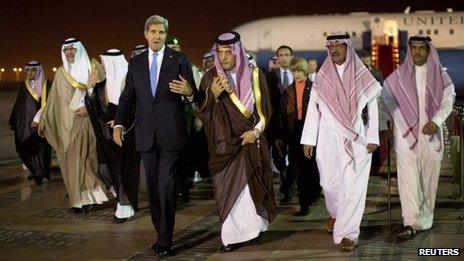
John Kerry said Saudi Arabia was "really the senior player in the Arab world"
The praise was effusive, disputes and abuses papered over and differences about vision dismissed as mere disagreements over tactics.
From Egypt to Saudi Arabia, US Secretary of State John Kerry was on a mission to put the relationship with two of his country's traditional allies in the region back on track after a difficult summer.
In Egypt, Mr Kerry praised what he said was progress made so far on the road map towards a new constitution and elections; he made no reference to the violent crackdown by the security forces this summer that left several hundred people dead.
Across Egypt, the US has been accused both of being in bed with the Muslim Brotherhood and of conniving with the military for the removal of Islamist President Mohammed Morsi.
After two years of upheaval in Egypt and in Washington's relationship with Cairo, the Obama administration seems intent to just move on and get down to work with the country's generals and the civilian rulers they installed.
'Help us help you'
The US message to Middle East now is: "We accept whomever is there, we want stability", according to Emile Hokayem, a Gulf-based analyst for the International Institute for Strategic Studies.
"The US feels political transformations in the region are too costly and undermine their regional interests," he explained.
One of the main messages to Egypt's generals and interim civilian government was "help us help you", said one US official travelling with Mr Kerry.
Washington wants Egypt's rulers to stay within certain bounds that allow the US to provide support and lift some restrictions on aid.
In his conversations with officials, Mr Kerry did say politically motivated arrests were unacceptable and in public he also condemned all acts of violence.
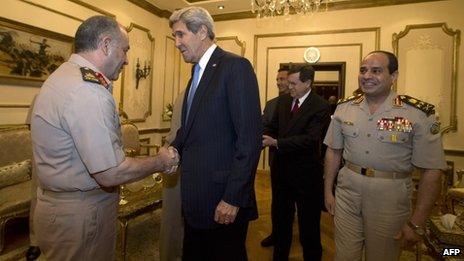
The Obama administration is getting down to work with Egypt's generals
But Egyptian officials did not agree not to extend the state of emergency when it runs out in mid-November.
They also asked for patience, another way perhaps of asking the US to understand if the process towards stability requires more iron-fisted moves.
Pulling in different directions
Getting the relationship with Egypt back on track was important in itself but it also matters to Washington's relationship with Saudi Arabia, where Mr Kerry headed after his short Cairo stop.
Much of what the secretary of state said in Egypt was meant for the ears of its Gulf allies.
The Saudis have not forgiven the US for siding with Egyptian protesters in January 2011 and effectively letting go of Hosni Mubarak.
Unhappy with the result- a Muslim Brotherhood president in Egypt - the Saudis gave a nod of approval to the Egyptian army's move to topple Mr Morsi in the summer. The US and its Gulf allies were in effect pulling in difference directions.
Saudi Arabia was also angered when Washington backed down from launching a military strike against Syria in September.
Saudi officials harshly and very publicly criticised the Obama administration for what they perceived as its timid approach to the region.
During a press conference in Riyadh, Mr Kerry hinted that he had spent some time explaining to King Abdullah and Saudi Foreign Minister Prince Saud al-Faisal the rationale behind President Barack Obama's decision.
"We don't see a lot of ways to end the violence [in Syria], certainly, that are implementable or palatable to us because we don't have the legal authority or the justification or the desire at this point to get in the middle of a civil war. And I think that's been made very clear," he said.
Mr Kerry also publicly praised Saudi Arabia, calling it "really the senior player in the Arab world".
'Relationship management'
But that still does not mean Riyadh agrees with the US.
"The visit was a form of relationship management, there is no significant policy correction," said Frederic Wehrey a Gulf expert at the Carnegie Endowment for International Peace in Washington.
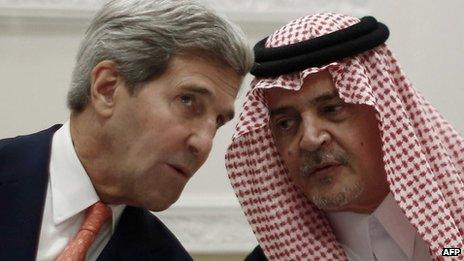
Mr Kerry spent some time explaining the US approach to the region
A senior US official said Saudi Arabia's warning that it was shifting away from Washington was also driven by insecurity and fear of losing a protector.
Saudi Arabia is terrified the US will somehow make a deal at its expense with Iran, its regional rival.
But Riyadh has few options to re-orient its foreign policy and find another protector or provider of defence hardware.
Mr Kerry said he had reassured the kingdom about the nuclear talks with Iran.
He had earlier also forcefully pushed back against any perception that the US was in retreat in the region or had no influence.
"Almost everywhere where you look in the region, the United States has a critical role to play, is playing a critical role, is helping nations to be able to defend themselves," he said.
"We will be there for the defence of our friends and our allies. We will be there for Saudi Arabia, for the Emirates, for the Qataris, for the Jordanians, for the Egyptians and others. We will not allow those countries to be attacked from outside. We will stand with them. So we have a major defensive relationship in the region."
The US is eager to keep Saudi Arabia close at this time because of concerns about Syria. While the US is focused on pushing for a peace conference, Saudi Arabia believes ramping up the arming of the rebels should be the priority.
Mr Hokayem said the concern was not so much that Saudi Arabia would embark on a successful venture to set up a rebel army in Syria that could go - or not go - against US policy but rather that the Saudis would go about it in a haphazard way that could have disastrous consequences, with the US having to pick up the pieces.
- Published4 November 2013
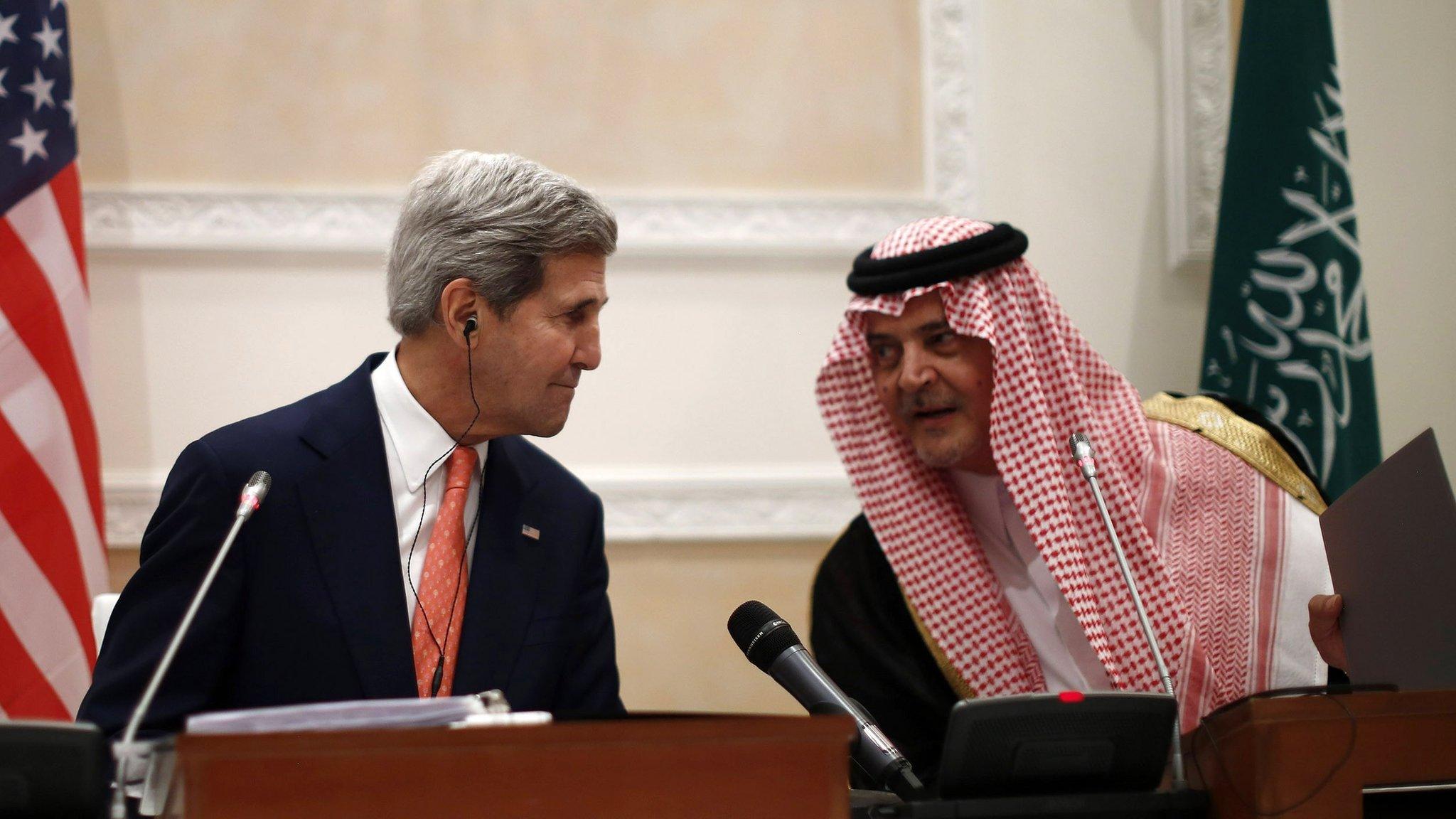
- Published3 November 2013
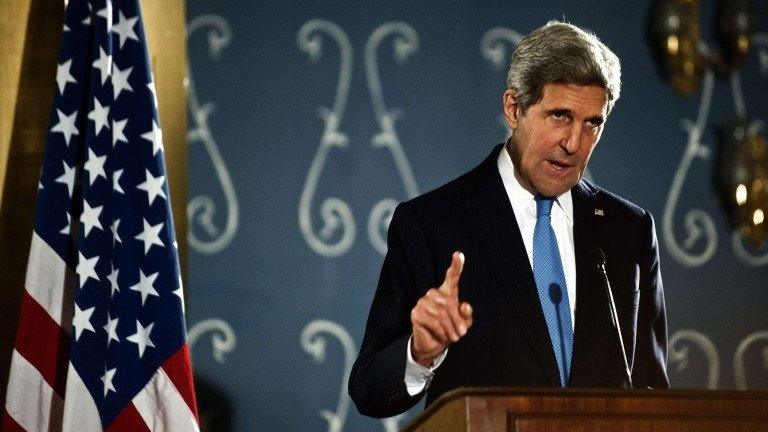
- Published23 October 2013
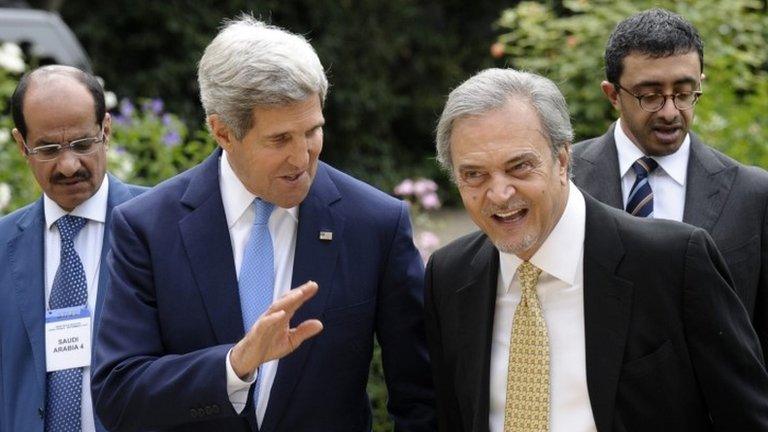
- Published3 November 2013
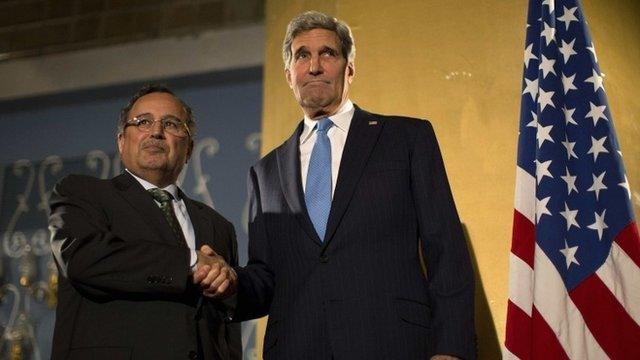
- Published4 October 2019